人教版高一英语Book1 Unit4 概要写作
- 格式:ppt
- 大小:466.50 KB
- 文档页数:17

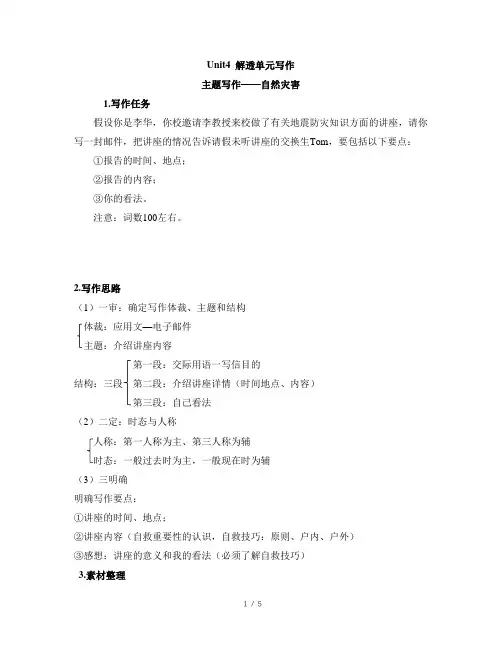
Unit4 解透单元写作主题写作——自然灾害1.写作任务假设你是李华,你校邀请李教授来校做了有关地震防灾知识方面的讲座,请你写一封邮件,把讲座的情况告诉请假未听讲座的交换生Tom,要包括以下要点:①报告的时间、地点;②报告的内容;③你的看法。
注意:词数100左右。
________________________________________________________________________ ________________________________________________________________________ ________________________________________________________________________ 2.写作思路(1)一审:确定写作体裁、主题和结构体裁:应用文—电子邮件主题:介绍讲座内容第一段:交际用语一写信目的结构:三段第二段:介绍讲座详情(时间地点、内容)第三段:自己看法(2)二定:时态与人称人称:第一人称为主、第三人称为辅时态:一般过去时为主,一般现在时为辅(3)三明确明确写作要点:①讲座的时间、地点;②讲座内容(自救重要性的认识,自救技巧:原则、户内、户外)③感想:讲座的意义和我的看法(必须了解自救技巧)3.素材整理(1)关键词语an expert on something关于……的专家deliver a speech发表演说self-rescue(skills)自救(技巧)stay/keep calm保持镇定in the open air在露天,在户外In summary总之,总而言之(2)完成句子①李教授,著名地震学专家,给我们做了一个如何在地震中自救的讲座。
(同位语)Professor Li,a famous expert ______ ______, delivered a speech self-rescue in an earthquake.②从讲座中,我们意识到了知道在地震发生时如何做的重要性。
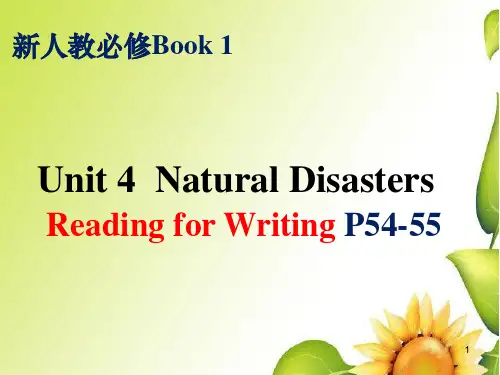
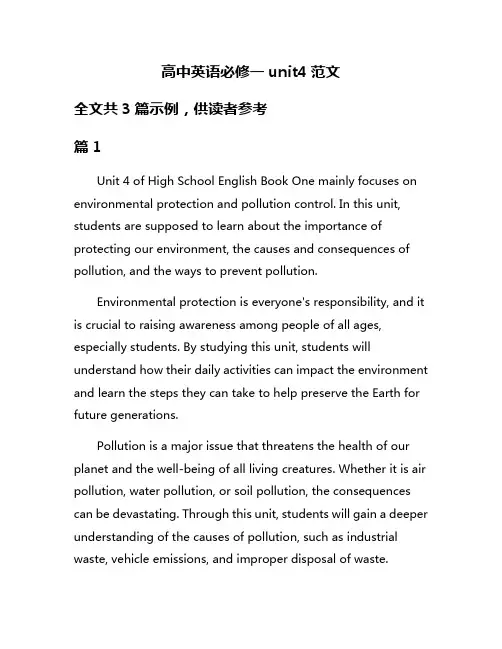
高中英语必修一unit4范文全文共3篇示例,供读者参考篇1Unit 4 of High School English Book One mainly focuses on environmental protection and pollution control. In this unit, students are supposed to learn about the importance of protecting our environment, the causes and consequences of pollution, and the ways to prevent pollution.Environmental protection is everyone's responsibility, and it is crucial to raising awareness among people of all ages, especially students. By studying this unit, students will understand how their daily activities can impact the environment and learn the steps they can take to help preserve the Earth for future generations.Pollution is a major issue that threatens the health of our planet and the well-being of all living creatures. Whether it is air pollution, water pollution, or soil pollution, the consequences can be devastating. Through this unit, students will gain a deeper understanding of the causes of pollution, such as industrial waste, vehicle emissions, and improper disposal of waste.To combat pollution, individuals must take action to reduce their carbon footprint and minimize their impact on the environment. This unit provides practical solutions and tips for students to follow, such as reducing energy consumption, recycling waste, and using eco-friendly products.Overall, Unit 4 of High School English Book One is essential for students to learn about environmental protection and pollution control. By studying this unit, students will be better equipped to make responsible choices and take action to protect our planet. The knowledge and skills gained from this unit will empower students to become responsible global citizens who are committed to safeguarding the environment for future generations.篇2Unit 4: EarthquakesEarthquakes are one of the most powerful and destructive natural disasters that can occur on our planet. They are caused by the sudden release of energy in the Earth's crust, resulting in seismic waves that can shake the ground and cause buildings to collapse. In this unit, we will explore the causes and effects ofearthquakes, as well as the ways in which they can be predicted and prevented.One of the primary causes of earthquakes is the movement of tectonic plates. The Earth's crust is divided into several large pieces, known as tectonic plates, which float on the semi-fluid mantle below. When these plates move past each other, they can become stuck and build up tension. When this tension is released, it causes the ground to shake, resulting in an earthquake.Earthquakes can have devastating effects on the environment and human populations. In addition to causing buildings to collapse and roads to crack, they can also trigger landslides and tsunamis. The destruction caused by earthquakes can result in loss of life and property, as well as long-term economic and social impacts on affected communities.Fortunately, scientists have made significant advancements in predicting and mitigating the impact of earthquakes. By monitoring seismic activity and studying fault lines, they can now predict when and where an earthquake is likely to occur. This allows authorities to issue warnings and evacuate residents inat-risk areas, reducing the potential for loss of life and property damage.In addition to prediction, efforts are also being made to prevent earthquakes from causing as much damage. Building codes are being implemented to ensure that structures are able to withstand the shaking and movement caused by earthquakes. Retrofitting older buildings and infrastructure can also help to make them more resilient to seismic activity.Overall, earthquakes are a powerful force of nature that can have devastating effects on our planet. By understanding the causes and effects of earthquakes, as well as implementing measures to predict and prevent their impact, we can work towards creating a safer and more resilient world for future generations.篇3Unit 4 of the high school English textbook focuses on the topic of "Earthquakes". In this unit, students learn about the causes of earthquakes, how they are measured, their effects, and ways to prepare for and respond to earthquakes. The following essay provides an overview of the key points covered in this unit.Earthquakes are natural disasters that occur when there is a sudden release of energy in the Earth's crust, causing the ground to shake. The main cause of earthquakes is the movement oftectonic plates, which are large pieces of the Earth's lithosphere that float on the semi-fluid asthenosphere beneath them. When these plates collide, slide past each other, or pull apart, it can result in the formation of faults, where rocks on either side of the fault move in different directions. When these rocks suddenly slip along the fault, it generates seismic waves that travel through the Earth and cause the ground to shake.Earthquakes are measured using the Richter scale, which assigns a magnitude to each earthquake based on the amplitude of the seismic waves it generates. The Richter scale is logarithmic, meaning that each whole number increase in magnitude represents a tenfold increase in the amplitude of the seismic waves and approximately 31.6 times more energy released. For example, an earthquake with a magnitude of 6.0 releases 31.6 times more energy than an earthquake with a magnitude of 5.0.The effects of earthquakes can be devastating, causing buildings to collapse, bridges to fail, roads to crack, and landslides to occur. In densely populated areas, earthquakes can result in a high number of casualties and widespread destruction. To mitigate the impact of earthquakes, it is important to be prepared and know how to respond in the event of an earthquake. This includes creating an emergency plan, securingfurniture and heavy objects, and knowing the safest places to take cover during an earthquake.Overall, Unit 4 of the high school English textbook provides students with a comprehensive understanding of earthquakes and how to prepare for and respond to them. By learning about the causes of earthquakes, how they are measured, their effects, and ways to mitigate their impact, students can be better equipped to protect themselves and others in the event of an earthquake. Earthquakes are natural disasters that are a constant threat, but with proper preparation and knowledge, we can minimize their impact and stay safe.。
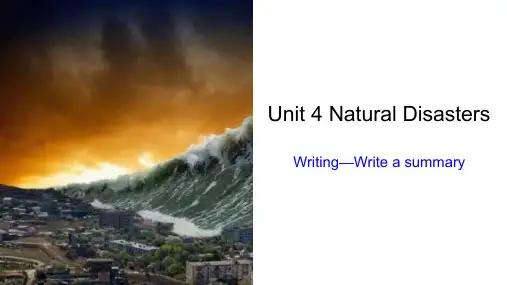
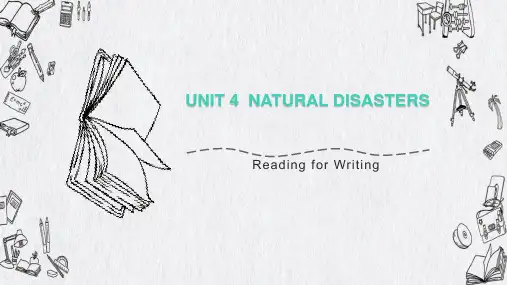



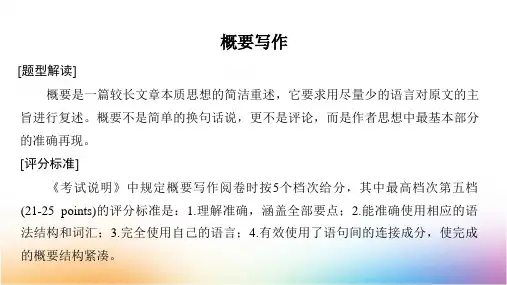
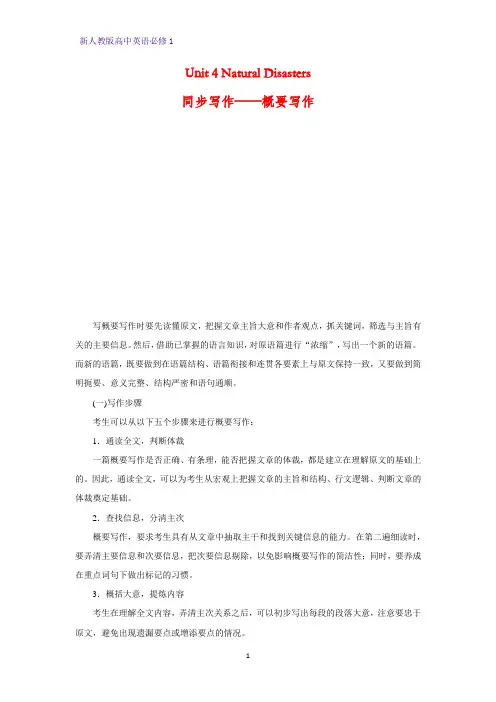
Unit 4 Natural Disasters同步写作——概要写作写概要写作时要先读懂原文,把握文章主旨大意和作者观点,抓关键词,筛选与主旨有关的主要信息。
然后,借助已掌握的语言知识,对原语篇进行“浓缩”,写出一个新的语篇。
而新的语篇,既要做到在语篇结构、语篇衔接和连贯各要素上与原文保持一致,又要做到简明扼要、意义完整、结构严密和语句通顺。
(一)写作步骤考生可以从以下五个步骤来进行概要写作:1.通读全文,判断体裁一篇概要写作是否正确、有条理,能否把握文章的体裁,都是建立在理解原文的基础上的。
因此,通读全文,可以为考生从宏观上把握文章的主旨和结构、行文逻辑、判断文章的体裁奠定基础。
2.查找信息,分清主次概要写作,要求考生具有从文章中抽取主干和找到关键信息的能力。
在第二遍细读时,要弄清主要信息和次要信息,把次要信息剔除,以免影响概要写作的简洁性;同时,要养成在重点词句下做出标记的习惯。
3.概括大意,提炼内容考生在理解全文内容,弄清主次关系之后,可以初步写出每段的段落大意,注意要忠于原文,避免出现遗漏要点或增添要点的情况。
4.获取要点,灵活表达为了使所写概要简明、扼要,就要对罗列的每段大意进行整合、合并;同时为了避免使用原文的句子,就需要考生灵活采用同义词或近义词进行替换,用不同的句式进行转换,并在必要的地方使用连接词,使表达连贯通顺。
5.检查修改,整理誊写写完初稿后,需要在内容上、语言上以及上下文的连贯性上进行检查:看是否包括了原文的所有要点,语言词汇的运用是否准确和地道,以及行文是否流畅;另外,还要注意词数限制和书写规范。
(二)改写句子基本方法1.同义替换法Tom thought of an idea.→An idea occurred to Tom.2.正话反说法I think wealth is less important than health.→I don't think wealth is more important than health.3.词性转换法Your suggestions are super valuable.→Your suggestions are of great value.4.利用介词短语法We are sure to finish it in time because so many people are helping us.→With so many people helping us,we are sure to finish it in time.5.句式变化法(1)语态变换It is widely accepted that more people use computers in the world today.→Computers are widely used in the world today.(2)简单句变复合句The weather turned out to be very good.This was more than we could expect.→The weather turned out to be very good,which was more than we could expect.(3)连词衔接法He insisted on staying.He was not willing to go.→He insisted on staying rather than going.(4)词序改变法Professor White,Professor Smith and many other guests were present at the meeting.→Present at the meeting were Professor White,Professor Smith and many other guests.(5)利用特殊句式法Jim wants to go boating and his parents want to go boating,too.→Jim wants to go boating,and so do his parents.顺接、递进:firstly/secondly/thirdly,besides,in addition,what's more,what's worse,what's more important,moreover,also,finally,last but not least转折:but,however,nevertheless,yet,instead,on the other hand,on the contrary,although,while原因:because,because of,since,as,for,now that,thanks to,due to结果:so,therefore,as a result,so that,then,so...that,such...that总结:to sum up,to conclude,in conclusion,in summary,in a word,in general,in short,above all,after all,generally speaking1.记叙文点明写作目的类:The writer tells us...(主题)by showing us an example of...,who/which...(故事情节) 作者经历类:In the passage,the writer mainly tells us his experience of doing sth.,which...他人经历类:This passage is mainly about sb.'s experience of doing sth....2.议论文The article gives the view that...should/shouldn't...(主题) ...(补充论据)The passage highlights the importance of sth....The author argues that...3.说明文现象解释类:This article points out the common phenomenon...(主题),which...(补充解释)利弊对比类:The article compares the disadvantages/benefits of A and B.The passage discusses the impact of sth.On the positive side...,but it may also...研究显示类:The study reveals that...The purpose of the report is to show that...阅读下面短文,根据其内容写一篇60词左右的内容概要。
概要是一篇较长文章本质思想的简洁重述,它要求用尽量少的语言对原文的主旨进行复述。
概要不是简单的换句话说,更不是评论,而是作者思想中最基本部分的准确再现。
1 .理解准确,涵盖全部要点;2.能准确使用相应的语法结构和词汇;3.完全使用自己的语言;4.有效使用了语句间的连接成分,使完成的概要结构紧凑。
概要写作的阅读材料词数一般为300左右。
写作要求考生在对原文阅读后根据其内容写出一篇约60词的内容概要。
概要所用语句既要用词准确,结构合理,语义连贯,不得抄写原文,又要能完全概括出文章的中心大意。
注意事项1.词数要限制在60词左右,上下不得超过10个单词。
2.要根据文章的体裁特点进行概要写作。
3.人称和时态要与所给文章中的人称和时态保持一致,但必要时也可变换成第三人称。
4.写作时尽可能地使用复合句,必要时可转换词性,不得完全照搬照抄原文。
英语概要写作的一般做题技巧1、整体把握全文为了更好的进行全文的一个概括以及更好的对全文的主旨有一定的把握,我们首先要做的一步就是要在整体上对文章有一个把握,从而可以更好的抽取有用的信息。
2、分出文章的主次、详略为了更好地找到文章的主次、详略之处,最重要的一点就是要学会阅读。
因此,在英语教学的过程中,英语老师要加强学生在阅读能力方面的培养,使其可以更好的分清文章主次详略要点。
3、整理大意,开始写作在进行了文章整体主旨把握,并对文章的主次详略要点进行了一定程度的分析后,在整理好文章的大致大意之后,就可以开始动笔写作了,这是最后也同样是最关键的一步。
因为,在最终成文的过程中,要特别注意对英语正确性的应用。
在写作时要特别注意下面几点:(1)概要应包括原文中的主要事实,略去不必要的细节。
(2)安排好篇幅的比例,概要应同原文保持协调,即用较多的文字写重要内容,用较少的文字写次要内容。
(3)注意要点之间的衔接,要用适当的关联词语贯通全文,切忌只简单地写出一些互不相干的句子,但也不要每两句之间都加关联词语,以免显得生硬。
必修一英语第四单元作文范文人教版全文共3篇示例,供读者参考篇1My Impression of Chinese and Foreign FestivalsFestivals are an important part of cultures around the world. They provide opportunities for people to celebrate, spend time with loved ones, and learn about their history and traditions. In this essay, I will share my thoughts and impressions of some major Chinese festivals as well as festivals celebrated in other countries.The Spring Festival, also known as Chinese New Year, is undoubtedly the most prominent festival in Chinese culture. This festival typically falls between late January and mid-February, marking the beginning of a new year on the lunisolar Chinese calendar. Preparations for the Spring Festival begin weeks in advance, with families thoroughly cleaning their homes to symbolically sweep away any misfortune from the previous year. On New Year's Eve, families gather for a sumptuous reunion dinner, often featuring dishes like dumplings, fish, and nian gao (a sticky rice cake). After midnight, firecrackers are set off to driveaway evil spirits, and children receive red envelopes containing money as a symbol of good luck.What impresses me the most about the Spring Festival is the emphasis on family unity. Despite the hustle and bustle of modern life, this festival serves as a reminder for families to come together, strengthen their bonds, and appreciate one another's company. The elaborate decorations, from red lanterns to upside-down fu characters (meaning "good fortune" when hung upside down), create a warm and festive atmosphere that permeates every household.Another significant Chinese festival is the Mid-Autumn Festival, which falls on the 15th day of the eighth lunar month. This festival celebrates the autumn harvest and is closely tied to the legend of Chang'e, the mythical lady on the moon. On this day, families gather to admire the full moon, eat mooncakes (dense pastries filled with lotus seed paste or other fillings), and spend quality time together. As a child, I always looked forward to carrying colorful lanterns and participating in lantern riddle games with my cousins.While Chinese festivals are deeply rooted in tradition, I have also had the opportunity to experience and appreciate festivals celebrated in other cultures. One such festival is Christmas, whichis widely celebrated in Western countries. Although I do not personally celebrate Christmas, I cannot help but be captivated by the festive spirit and warm atmosphere that envelops cities and towns during this time of year. From the twinkling lights and篇2Unit 4: My LifestyleHave you ever wondered what it's like to be a modern teenager? Well, let me give you a glimpse into my daily life and the lifestyle I lead. Buckle up, because it's a wild ride!First things first, let's talk about school. As a high school student, a significant portion of my day is dedicated to attending classes and completing assignments. I wake up early, around 6:30 a.m., to get ready for the day ahead. After a quick breakfast, I hop on the school bus or get dropped off by my parents, depending on the day.Once I arrive at school, the real adventure begins. My classes range from core subjects like English, Math, and Science to electives like Art and Physical Education. While some classes can be challenging, I try to stay focused and engaged, knowing that education is the key to unlocking future opportunities.During breaks and lunchtime, the school campus becomes a bustling hub of social activity. This is where I catch up with my friends, exchange stories, and engage in lively discussions about the latest trends, movies, or viral memes circulating on social media. It's a time to recharge and connect with others before diving back into the academic grind.After school, my schedule varies depending on the day. Some days, I have extracurricular activities like sports practice or club meetings. Other days, I head home to tackle homework assignments or study for upcoming exams. Time management is crucial, as I have to strike a balance between academics, social life, and personal interests.Speaking of personal interests, I enjoy indulging in various hobbies and activities during my free time. Whether it's reading a captivating novel, experimenting with new recipes in the kitchen, or exploring the great outdoors through hiking or camping, I make an effort to nurture my passions and find ways to relax and unwind.Weekends are a breath of fresh air, offering a much-needed break from the hectic weekday routine. This is when I truly get to embrace my social side. Hanging out with friends, going to the movies, or attending local events are all part of my weekendagenda. It's a time to let loose, have fun, and create lasting memories.Of course, no teenager's life would be complete without the ever-present influence of technology. Smartphones, social media, and the internet play a significant role in my daily interactions and entertainment. I use various apps and platforms to stay connected with friends, share updates, and consume content like music, movies, and video games.However, I also try to maintain a healthy balance and not let technology consume too much of my time. I make a conscious effort to engage in activities that don't involve screens, such as reading physical books, practicing a musical instrument, or simply spending quality time with family and loved ones.As you can see, my lifestyle as a modern teenager is a delicate balancing act. It's a constant juggling of responsibilities, social connections, personal interests, and the ever-present allure of technology. While it can be challenging at times, I wouldn't have it any other way. This is the time to explore, learn, and grow, shaping the person I aspire to become.So, there you have it – a glimpse into the life of a modern teenager. It's a whirlwind of experiences, emotions, and adventures, all woven together to create a unique andunforgettable journey. Embrace the chaos, cherish the moments, and never stop pursuing your dreams. After all, that's what being a teenager is all about!篇3Unit 4: Sports and ExerciseAs a high school student, physical education classes and staying active have always been an important part of my life. Not only does exercise keep me healthy, but sports have taught me valuable lessons that extend far beyond the playing field.To begin with, participating in team sports like basketball and soccer has instilled in me the importance of cooperation and teamwork. Even the most talented individual cannot win games alone – it takes every player doing their part and working together towards a common goal. On the basketball court, performing give-and-go plays or setting screens requires complete trust and coordination with teammates. Likewise, maintaining possession and creating scoring opportunities in soccer relies on crisp passing and movement off the ball. These experiences have highlighted that great achievements rarely come from a single person's efforts, but rather through the combined talents and hard work of a dedicated group.Additionally, athletic competition has been instrumental in developing my discipline, perseverance, and resilience. The road to success in sports is hardly ever smooth – there are frequent setbacks, difficult practices, losses, and failures along the way. However, those challenges have taught me not to get discouraged, but to pick myself back up, identify areas for improvement, and come back even stronger. The grueling conditioning sessions in preseason, the tough losses after battling until the final whistle, and finally achieving hard-earned victories have all reinforced the mindset that with enough dedication and determination, even the loftiest goals can be attained. These lessons in perseverance will undoubtedly prove valuable as I encounter obstacles and adversity in all walks of life.Furthermore, sports have provided an excellent environment to nurture my leadership abilities. As team captain for several seasons, I was tasked with rallying my teammates, delivering pre-game speeches to boost morale, and making key decisions in the heat of competition. This experience forced me to hone skills like clear communication, emotional intelligence, and quick thinking under pressure. I also had to lead by example, consistently arriving early for practice, exerting maximum effort, and maintaining a positive attitude even after losses. The responsibilities of being a captain stretched my abilities andallowed me to gain practical experience in motivating others and taking charge when it mattered most.Of course, individual athletic pursuits like long-distance running and swimming have their own set of unique benefits. The solitary nature of these endurance sports nurtures traits of self-discipline, determination, and psychological toughness. During grueling training sessions and competitions with the constant temptation to quit, I've learned to strengthen my mental fortitude, focus on controllable factors, and push through pain and fatigue. Victories in these individual sports are deeply personal accomplishments that have instilled tremendousself-confidence in my abilities. Furthermore, the rhythmic and meditative aspects of endurance training provide a healthy outlet to alleviate stress and reflect on my thoughts and goals outside of sports.Looking ahead, I firmly believe the tangible skills and intangible lessons that I've gained from athletic participation will prove invaluable as I progress through life. The values of teamwork, perseverance, leadership, and self-discipline that sports have cultivated in me are the same ones needed for success in any endeavor – be it academic, professional, or personal. My experiences competing have not only kept mephysically fit, but have forged an indomitable mindset that will push me to overcome whatever challenges come my way. Simply put, sports have molded me into a well-rounded individual prepared to thrive in all arenas of life.In conclusion, athletic pursuits like team sports, endurance training, and physical education classes have been paramount in shaping my character and equipping me with tools for success beyond physical fitness. The lessons of teamwork, perseverance through adversity, leadership, and self-discipline will undoubtedly serve me well as I pursue my academic and career ambitions. While the competitions and achievements are rewarding in their own right, the true value of sports lies in nurturing the intangible qualities and mentality that will propel me forward in all my future endeavors.。
Unit1-4作文参考Unit 1 建议信开头:I would like to suggest that…I am writing with my suggestion proposal about…I am writing to express views concerning…You have asked me for my advice with regard to…and I will try to make some conduc tive suggestions.正文:I feel that it would be beneficial if…I would like to suggest that…I would recommend that…If I were you, I would…You may consider doing…It would seem to me that you could…As you may agree that…结尾:I hope you will find these suggestions/proposals/recommendations helpful/practical/ useful.I trust you will take my suggestion into account.I would be more than happy to see improvements in this regard.I would be ready to discuss this matter to further details.范文:Dear Xiaodong,I’m sorry you are having trouble in making friends. However, the situation is easy to change if you take my advice. Here are some tips to help you.Firstly, why not ask people their likes and dislikes? If you do this, you will find some classmates with the same interests. And it’s easier for you to communicate with them and find some topics to share since you might have something in common.Secondly, you should join in discussions and show interest in other people’s ideas. Then you can get to know different people and let them see you are friendly. But if you don’t, you shouldn’t feel afraid to say, for example, “That sounds interesting. What is it about?” Once you start talking to one person, it will get easier to talk to other.Thirdly, it would be a good idea if you offer help when people are in trouble. By doing this, people will believe you are a kind boy, they will be glad to make friends with you.I hope you’ll find these ideas useful. Good luck!Yours,Miss WangUnit 2 “My experience of learning English”Useful ExpressionI ( don’t ) like …I’m fond of … /I’m interested in …I’m crazy about …/I’m poor in / not good at listening… /I have some trouble with …I have some difficulty in …. / I find … difficult / hard to learn …范文1:Learning English is a very painful experience for me. At the very beginning, it is very hard for me to express myself in English. Whenever I tried my best to speak English in class, I would be laughed by my classmates. After that I had no confidence to speak English any more. I suffered a lot in the class because I did not want to lose face in front of my friends. Gradually, I found it had nothing to do with my English study. I had made a fool of myself. I realized that the best way to prove myself is to study harder and caught up with others. So I seized every chance to speak English in class as well as in free talk. What’s more, I did morning reading every day. I continued working till now. To my great joy, I can speak beautiful English now. The experience is painful but also helpful.范文2:Dear Mr. Li,I’m glad to tell you that I have made great progress in my English study since I become a senior high student.When I started senior English in the beginning, I found it much more difficult than what we learned in junior school and I almost lost heart. Later, I realized the importance of English, so I got up early every morning, recited English words, listened to English tapes and did a lot of exercises. I also asked my teachers and classmates for better ways of learning English.Now, I’m improving my English greatly. And I’m getting more and more interested in learning it. Thank you so much for your great help in your class.Wish you all the best!Yours,Li HuaUnit 3 My travel experience表示时间顺序的词: First of all, then, after that, later, finallyin the early morning, in the morning, at noon,in the afternoon, in the late afternoon, at dusk,at night, at midnight,next day…范文1:Last summer holiday, I went to HaiNan with my family. The weather was pleasant! The sky was blue more than I could describe, the sea was blue and bright more than I could believe. Walking by the sea is just like being in the oil painting! We sailed to an island called Xidao. I swam there. Swimming in the sea is quite different from that in a pool. Bedsides swimming, we also had a good meal there. We had a nice seafood dish. And I bought back many beautiful shells. If you want to have a look, you may ask me. Or, we may go to Hainan together, for I am always hoping to come to that place again. I really like that place, a place of blue and brightness.范文2:Dear Li Ping:The National Day is over. We spent a happy 7-day long leave.My parents and I went to the countryside not far away from our home to have a two-day trip by bicycle. We set out at 7 o’clock in the morning on October 1. My dad and I took different kinds of things for our picnic. Having got there, we began to fish. After that we enjoyed my mum’s cooking, which was very delicious. Cycling there made myself completely relaxed, beautiful scenery and warmth with my parents made me a lot happier. Besides, we stayed in my uncle’s and had a small family party there at night. We returned the next afternoon. That is a better National Day for me.Hope to hear from you soon.Yours,Wang FeiUnit 4 演讲有一批要到中国投资的外国企业家在我国某城市参观考察。